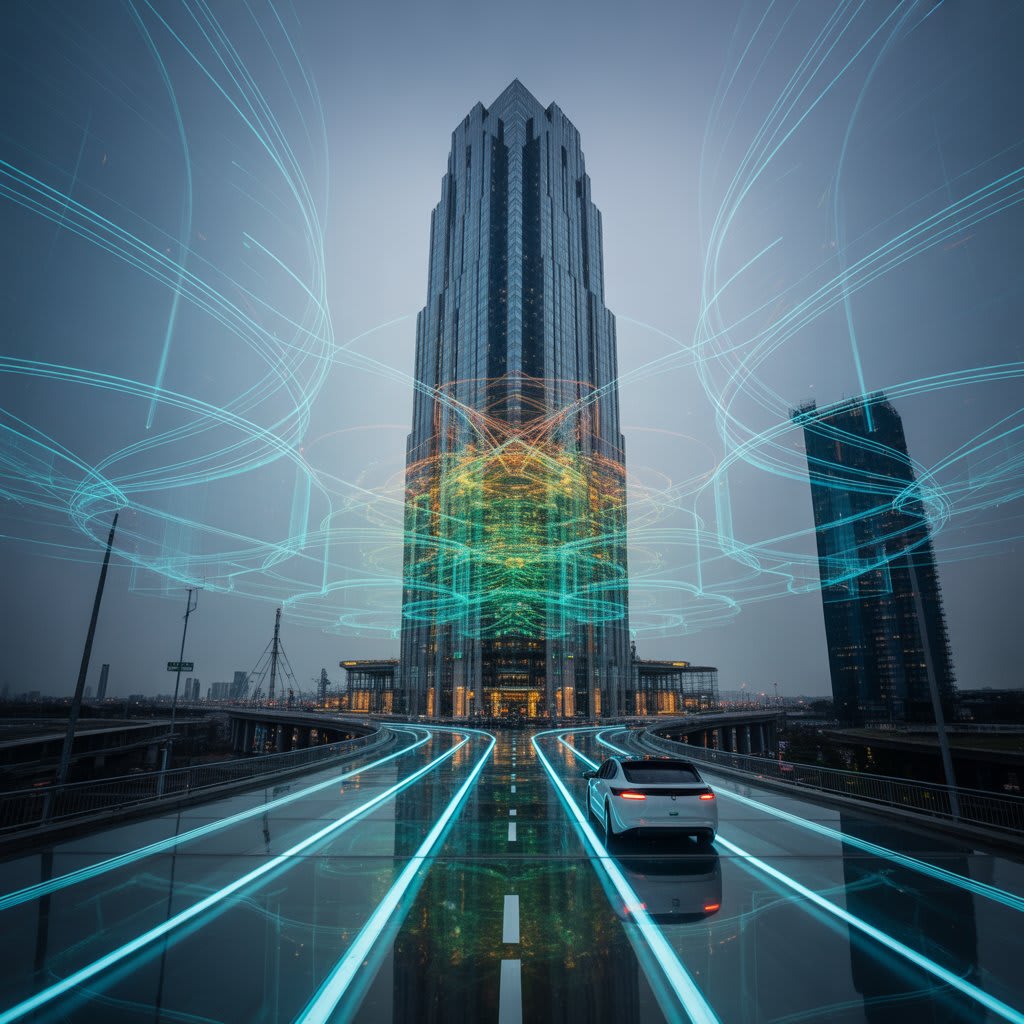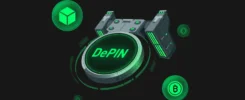introduction
Artificial intelligence (AI) is changing the way we live, work, and make decisions. On the other hand, blockchain technology is redefining trust, transparency and data ownership. When these two powerful technologies meet, they create something extraordinary – AI agents are built on blockchain.
In 2025 and beyond, the combination of AI and blockchain technology is expected to drive the next major technology revolution. This integration enables the creation of secure and autonomous systems that can make decisions, learn and transact without human intervention – all while maintaining transparency and privacy.
Understanding Artificial Intelligence Agents on Blockchain
What are artificial intelligence agents?
AI agents are autonomous programs capable of intelligently performing tasks—such as analyzing data, making predictions, or interacting with users—without direct human control. Examples include chatbots, personal assistants, autonomous trading bots, and decision-making systems.
What happens when you put AI on the blockchain?
When AI agents run on blockchain technology, they become decentralized and transparent. This means:
- There is no single entity controlling them.
- They can access and share verified data securely.
- They can execute smart contracts automatically.
- Their actions are recorded in immutable ledgers of accountability.
Essentially, AI agents become trustless digital entities – able to operate in ecosystems such as finance, healthcare, logistics and governance.
How Artificial Intelligence Agents Work on Blockchain
AI agents in blockchain combine three main layers of technology:
A. Blockchain layer
This acts as a foundation of trust — storing immutable records of data, transactions, and agent interactions.
for. Artificial intelligence layer
This layer gives agents intelligence – enabling them to analyze data, learn patterns, and make independent decisions.
C. Smart contract layer
Smart contracts automate agreements and ensure that AI agents act according to pre-defined rules.
example:
A decentralized AI agent can manage energy distribution in a smart grid – buying and selling energy autonomously between users via smart contracts on the blockchain.
Benefits of Building AI Agents on Blockchain
The blockchain-AI combination creates revolutionary advantages:
- Transparency: Every action an AI agent takes is recorded on-chain.
- Security: Blockchain technology ensures data stability and protects it from tampering.
- Data ownership: Users control their own data, reducing privacy risks.
- Automation: Smart contracts eliminate intermediaries in the decision-making process.
- Interoperability: AI agents can collaborate across decentralized networks.
- Trustless Collaboration: Multiple AI systems can cooperate without a central authority.
This synergy paves the way for autonomous, self-managing digital ecosystems.
Real-world applications of Blockchain-based AI agents
Blockchain AI agents are already shaping multiple industries:
1. Decentralized Finance (DeFi)
AI agents can monitor market trends, execute trades, and rebalance portfolios – all transparently recorded on the blockchain.
2. Supply chain
AI-powered agents verify product authenticity, track shipments, and predict disruptions while sharing verifiable data via blockchain.
3. Health care
Blockchain technology ensures the privacy of patient data while AI agents analyze medical data to suggest treatments and manage records securely.
4. Energy management
Decentralized AI networks distribute renewable energy efficiently, while verifying transactions on the blockchain.
5. Smart cities
AI agents manage traffic lights, waste collection, and energy consumption in real time, all of which can be audited through blockchain systems.
Challenges of Building AI Agents on Blockchain
Despite the potential, combining AI and blockchain technology presents technical and ethical challenges.
A. Scalability:
The limited blockchain transaction speed can slow down AI operations.
for. Data privacy:
Public blockchains may expose sensitive data unless privacy layers are added (such as zk-SNARKs).
C. complexity:
Integrating AI models into smart contracts requires advanced expertise.
D. It costs:
Training and running AI agents on decentralized systems can be expensive due to high computing power needs.
e. Systems:
Legal frameworks for independent agents are still evolving globally.
Addressing these issues will be key to realizing the full potential of AI in blockchain technology.
Case Studies: Artificial Intelligence and Blockchain in Action
1. fetch.ai
A decentralized AI network that allows autonomous agents to negotiate and transact – from ride sharing to supply chain optimization.
2. SingularityNET
Founded by Dr. Ben Goertzel, this platform allows developers to create, share and monetize AI services using blockchain technology. It is one of the pioneers of decentralized AI marketplaces.
3. Ocean Protocol
Enabling data sharing through blockchain while allowing AI systems to learn from encrypted data without violating privacy.
4. Deep Brain series
A blockchain-based AI computing platform that reduces the cost of AI training through decentralized computing power.
Each of these examples demonstrates how the synergy between AI and blockchain technology is reshaping innovation and creating entirely new digital economies.
The future: autonomous economies and on-chain artificial intelligence
In the coming years, AI agents built on blockchain technology will lead to the emergence of autonomous digital economies, where machines transact, negotiate and make decisions autonomously.
Imagine:
- Self-managing companies (DAOs) are run entirely by AI agents.
- AI-powered crypto wallets make investment decisions.
- Decentralized data marketplaces where AI agents securely buy and sell insights.
- Cross-chain intelligence, where AI agents communicate across multiple blockchains.
This future is not far-fetched, and is already unfolding in early experiments across the Web3 ecosystem.
Industry Forecast:
According to MarketsandMarkets, the AI blockchain market is expected to grow from $700 million in 2024 to $10 billion by 2030, driven by automation and decentralized intelligence.
Building an AI Agent on Blockchain Technology: A Step-by-Step Overview
If you’re a developer or organization exploring this area, here’s a simplified roadmap:
- Define a use case: Identify a problem that AI can solve within a decentralized context.
- Select a Blockchain platform: Ethereum, Solana, or Polygon for smart contracts; Or Hyperledger for special use cases.
- AI Model Development: Train your model for predictive or decision-making tasks.
- Integrate smart contracts: Use Solidity or Rust to code your AI agent’s logic.
- Deployment on Blockchain: Host your agent on a decentralized network.
- Add Oracles and APIs: Feed real-world data into your AI model.
- Enable management via DAO: Allow users to vote on updates and parameters.
- Monitor and Improve: Track performance and make improvements over time.
This process links AI’s adaptability to blockchain trust – creating fully autonomous systems.
Business Impact: Why companies are investing in Blockchain-based AI
Companies are starting to realize that AI + blockchain = exponential value.
Business Advantages:
- Cost Reduction: Automation eliminates middlemen.
- Increased trust: Transparent decision making enhances brand credibility.
- Faster innovation: Shared data and open models accelerate the R&D process.
- Monetization: Companies can sell AI capabilities through premium ecosystems.
example:
Pharmaceutical companies can collaborate via blockchain technology while keeping proprietary data secure – with AI agents collectively analyzing results to speed up drug discovery.
Ethical and governance considerations
As AI becomes increasingly autonomous, governance and accountability become critical. Blockchain technology provides a solution – immutable records make every decision made by AI traceable.
However, questions remain:
- Who is responsible if an AI agent makes a bad decision?
- How can we ensure ethics in AI when decision-making is decentralized?
- What legal status should independent agents have?
To address this problem, developers are designing AI governance frameworks that combine blockchain transparency with ethical AI standards.
13. Looking to the future: the next technical revolution
The integration of artificial intelligence and blockchain technology is the foundation of Web4 – the intelligent and autonomous Internet.
Soon we will see:
- AI-powered decentralized autonomous organizations that operate autonomously without human managers.
- Personal AI assistants that use blockchain identities to manage finances.
- Intelligent supply chains that predict and act without human intervention.
This revolution is creating a self-regulating, decentralized, and intelligent economy – and blockchain technology is the layer of trust that makes this possible.
Frequently Asked Questions (FAQ)
1. What are blockchain-based AI agents?
They are autonomous programs that use artificial intelligence to make decisions and blockchain technology to store and execute data securely and transparently.
2. How do AI agents differ from traditional robots?
Traditional bots rely on centralized servers, while blockchain-based AI agents operate autonomously, transparently and immutably.
3. Which industries will benefit most from AI in blockchain technology?
Finance, healthcare, logistics, energy – any sector where automation, data security and transparency are key.
4. Is building AI agents on blockchain expensive?
Initial costs can be high due to computing and data needs, but the return on investment and long-term efficiency gains are significant.
conclusion
The integration of artificial intelligence and blockchain technology is not just another trend – it is the next stage of technological development. By embedding intelligence into decentralized systems, we are building a world where digital agents can work, learn and evolve autonomously – securely and transparently.
As companies explore autonomous systems, decentralized data markets, and intelligent governance, blockchain-based AI agents will be the foundation for a new era in digital transformation.
Are you ready to build your own An AI-powered future on the blockchain? The next technology revolution has already begun, and it is intelligent, decentralized, and unstoppable.





